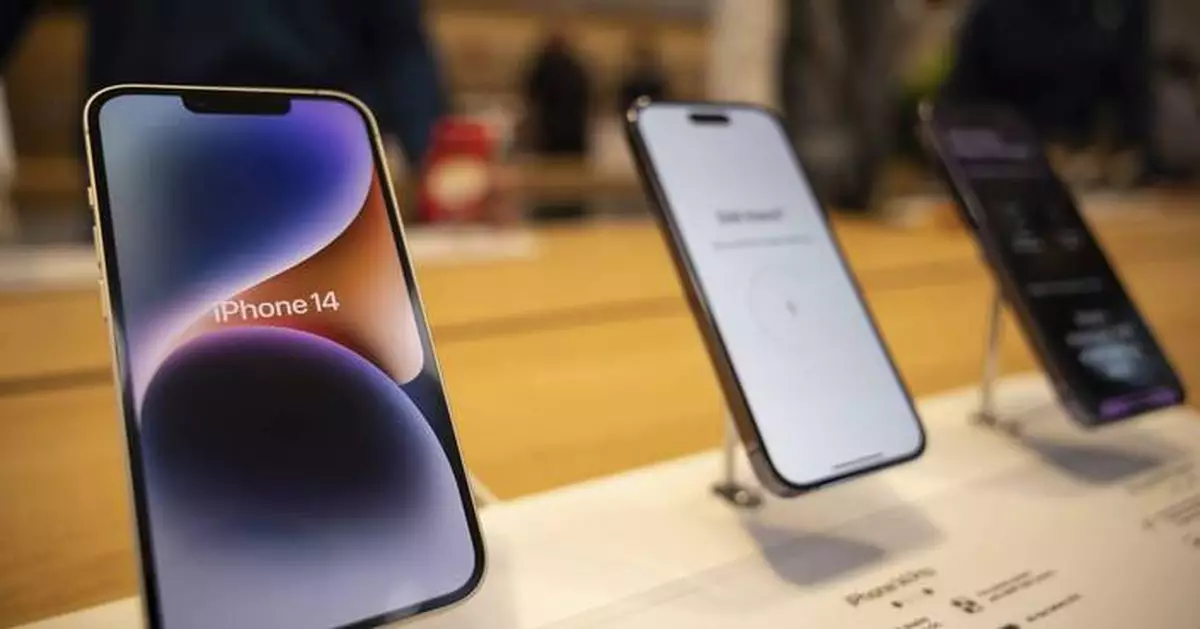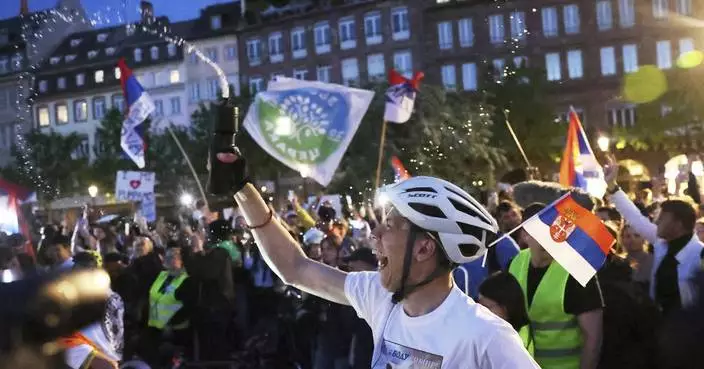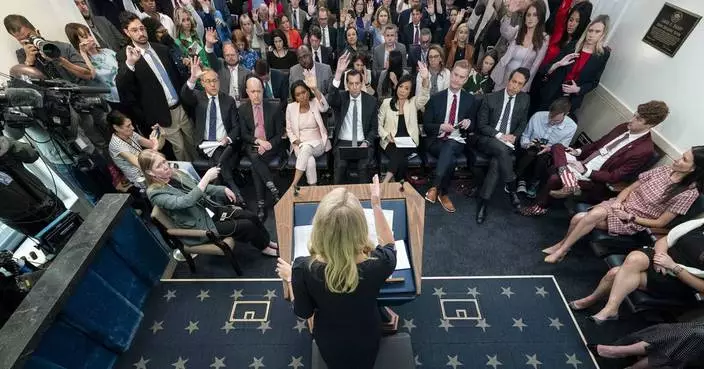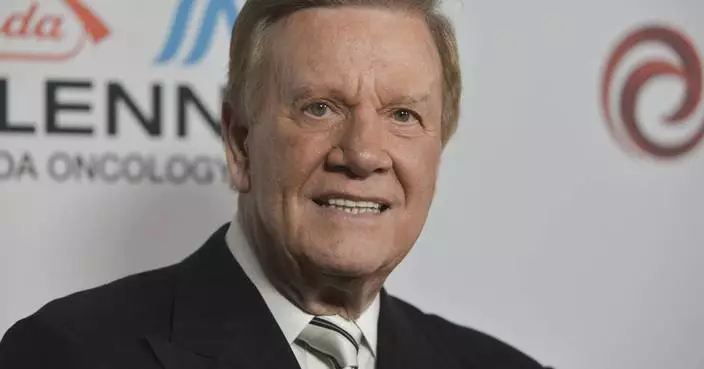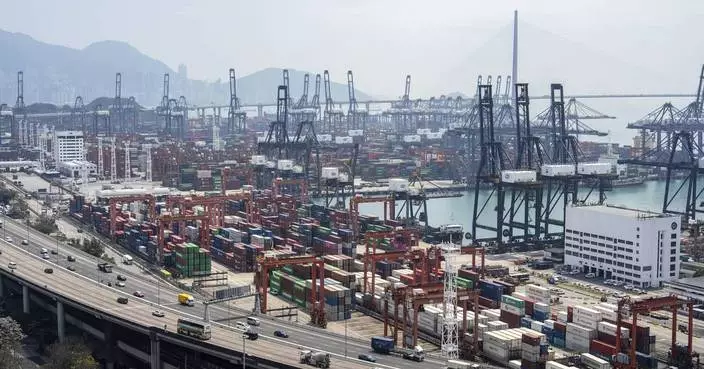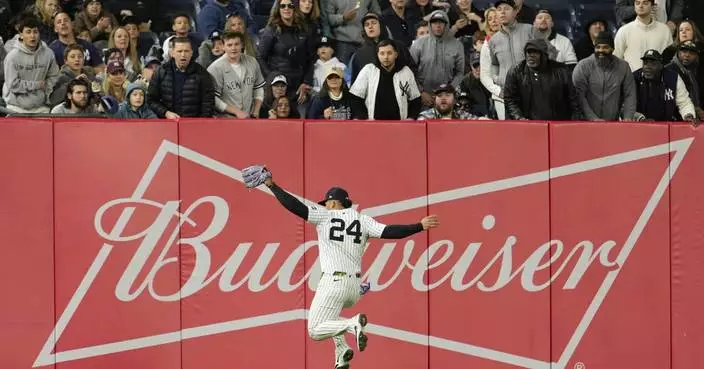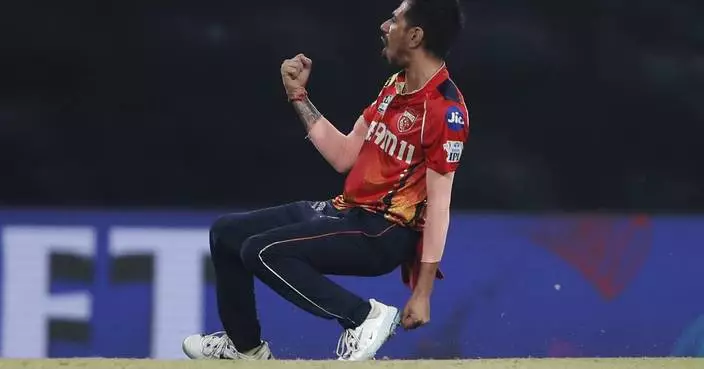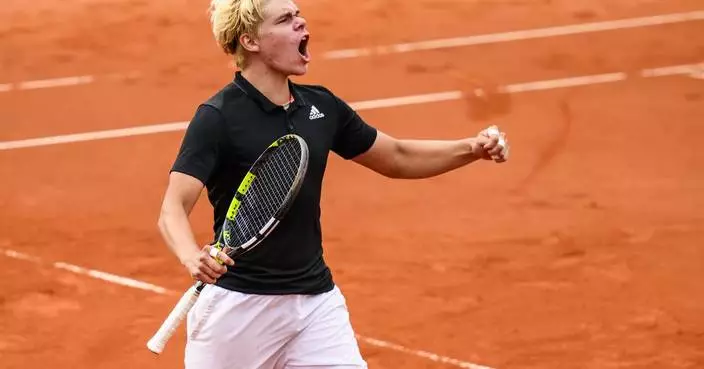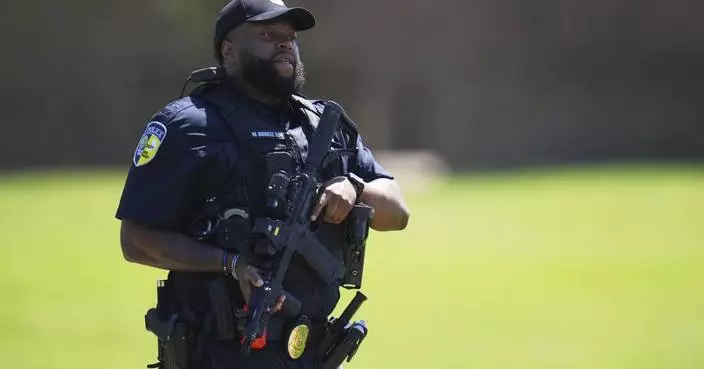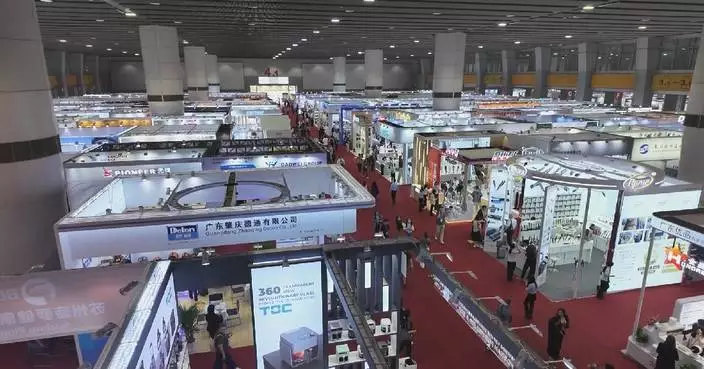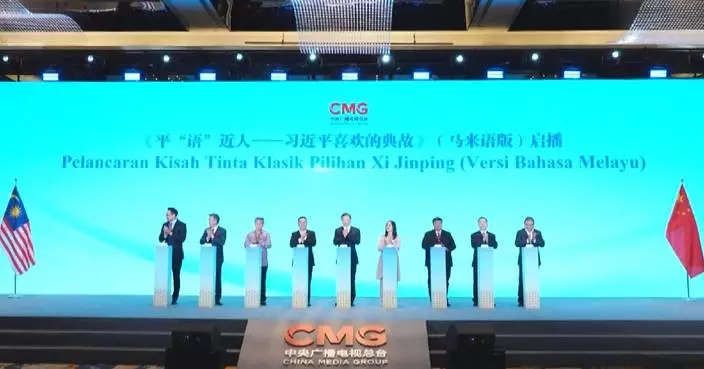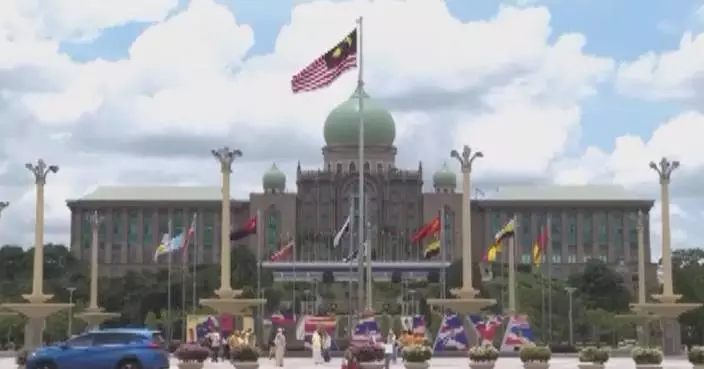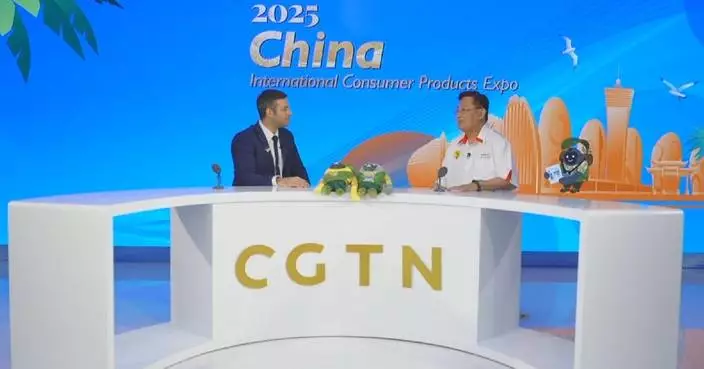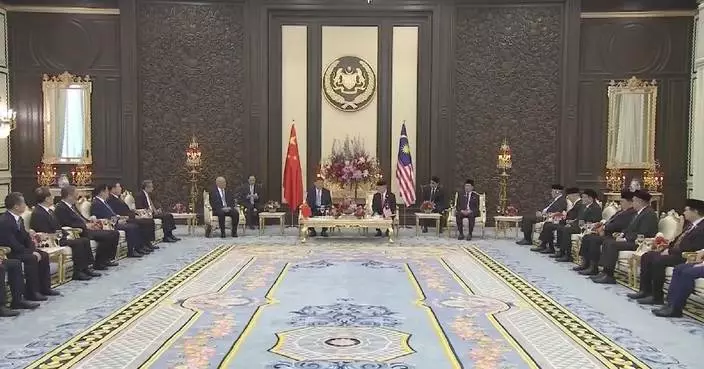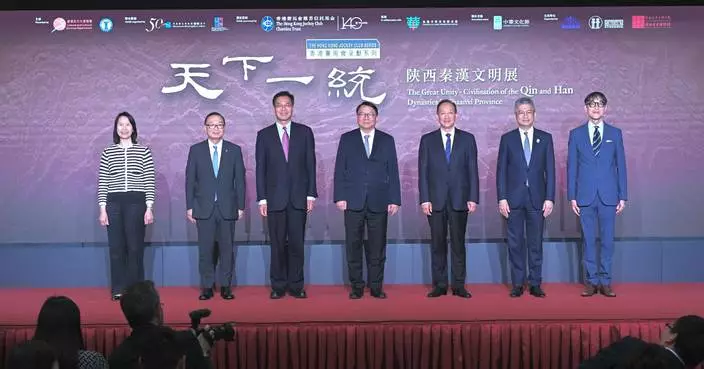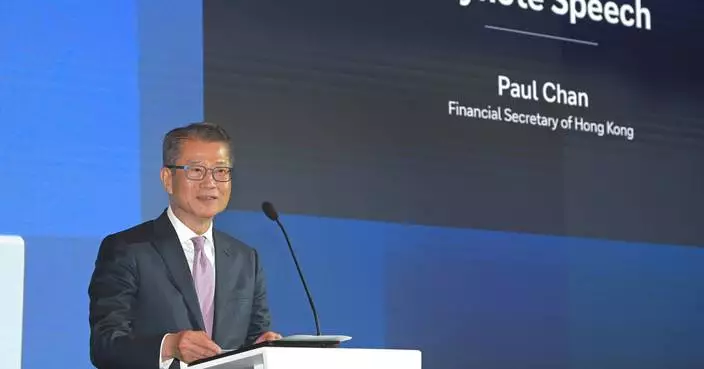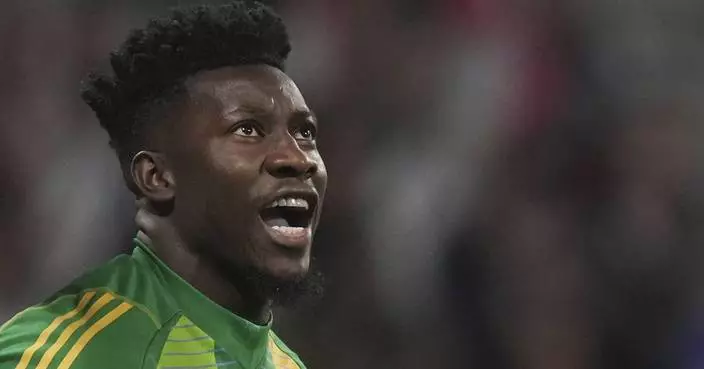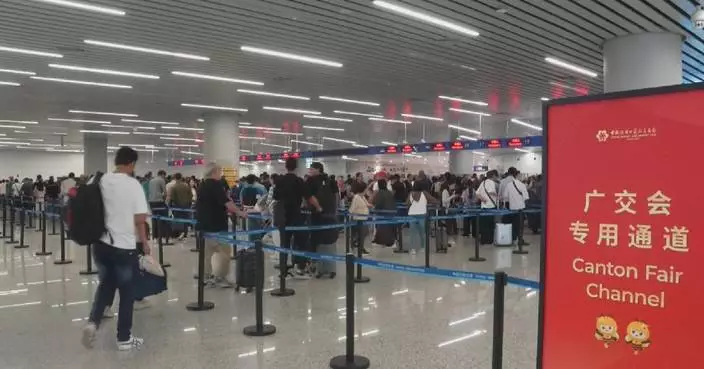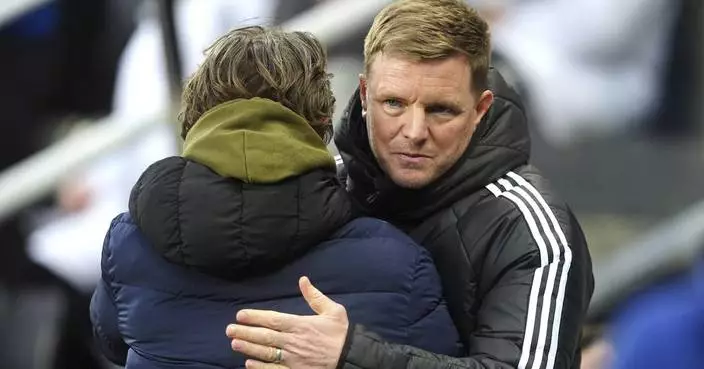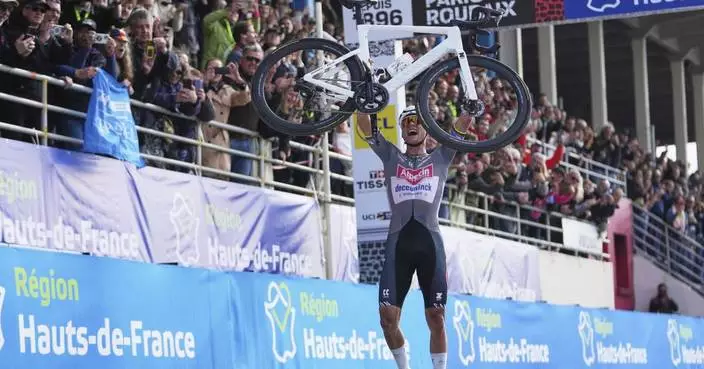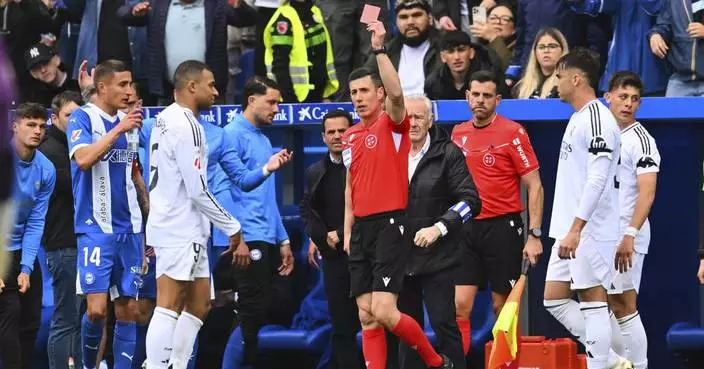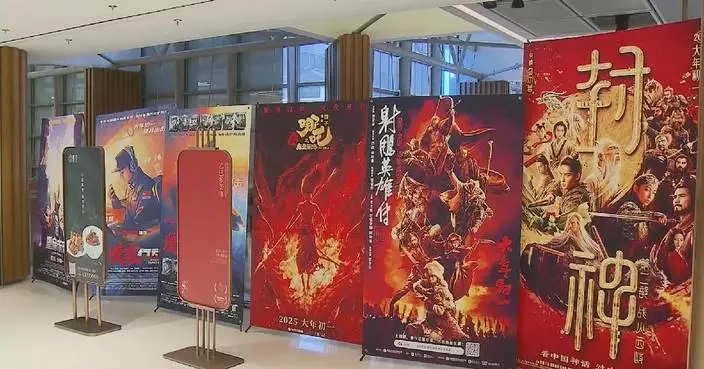NASHVILLE, Tenn. (AP) — Tariff exemptions announced Friday on electronics like smartphones and laptops are only a temporary reprieve until the Trump administration develops a new tariff approach specific to the semiconductor industry, U.S. Commerce Secretary Howard Lutnick said Sunday.
White House officials, including President Donald Trump himself, spent Sunday downplaying the significance of exemptions that lessen but won't eliminate the effect of U.S. tariffs on imports of popular consumer devices and their key components.
“They’re exempt from the reciprocal tariffs but they’re included in the semiconductor tariffs, which are coming in probably a month or two,” Lutnick told ABC's “This Week” on Sunday.
Trump added to the confusion hours later, declaring on social media that there was no “exception” at all because the goods are “just moving to a different" bucket and will still face a 20% tariff as part of his administration's move to punish China for its role in fentanyl trafficking.
The Trump administration late Friday had said it would exclude electronics from broader so-called reciprocal tariffs, a move that could help keep the prices down for phones and other consumer products that aren’t usually made in the U.S.
China's commerce ministry in a Sunday statement welcomed the change as a small step even as it called for the U.S. to completely cancel the rest of its tariffs.
Sparing electronics was expected to benefit big tech companies like Apple and Samsung and chip makers like Nvidia, though the uncertainty of future tariffs may rein in an anticipated tech stock rally on Monday.
U.S. Customs and Border Protection said items like smartphones, laptops, hard drives, flat-panel monitors and some chips would qualify for the exemption. Machines used to make semiconductors are excluded too. That means they won’t be subject to most of the tariffs levied on China or the 10% baseline tariffs elsewhere.
It was the latest tariff change by the Trump administration, which has made several U-turns in its massive plan to put tariffs in place on goods from most countries. White House officials sought to dismiss any suggestion of a reprieve as the weekend progressed.
“It’s not really an exception. That's not even the right word for it,” U.S. Trade Representative Jamieson Greer told CBS’ “Face the Nation” on Sunday. “This type of supply chain moved from the tariff regime for the global tariff, the reciprocal tariff, and it moved to the national security tariff regime.”
Greer added that “the president decided that we’re not going to have exemptions. We can’t have a Swiss cheese solution to this universal problem that we’re facing.”
On Air Force One Saturday night, President Donald Trump told reporters he would get into more specifics on exemptions on Monday. In his post Sunday on TruthSocial, he promised the White House was “taking a look at Semiconductors and the WHOLE ELECTRONICS SUPPLY CHAIN.”
Some had assumed the exemption filed Friday night reflected the president’s realization that his China tariffs are unlikely to shift more manufacturing of smartphones, computers and other gadgets to the U.S. any time soon, if ever.
The administration has predicted that the trade war prod Apple to make iPhones in the U.S. for the first time, but that was an unlikely scenario after Apple spent decades building up a finely calibrated supply chain in China.
It would take several years and cost billions of dollars to build new plants in the U.S., burdening Apple with economic forces that could triple the price of an iPhone and torpedo sales of its marquee product.
The turmoil has battered the stocks of tech’s “Magnificent Seven” -- Apple, Microsoft, Nvidia, Amazon, Tesla, Google parent Alphabet and Facebook parent Meta Platforms.
At one point, the Magnificent Seven’s combined market value had plunged by $2.1 trillion, or 14%, from April 2 when Trump unveiled sweeping tariffs on a wide range of countries. When Trump paused the tariffs outside of China on Wednesday, the lost value in those companies was pared to $644 billion, or a 4% decline.
An electronics exemption would fulfill the kind of friendly treatment that industry was envisioning when Apple CEO Tim Cook, Tesla CEO Elon Musk, Google CEO Sundar Pichai, Facebook founder Mark Zuckerberg and Amazon founder Jeff Bezos assembled behind the president during his Jan. 20 inauguration.
That united display of fealty reflected Big Tech’s hopes that Trump would be more accommodating than President Joe Biden’s administration.
Apple won praise from Trump in late February when the Cupertino, California, company committed to invest $500 billion and add 20,000 jobs in the U.S. during the next four years. The pledge was an echo of a $350 billion investment commitment in the U.S. that Apple made during Trump’s first term when the iPhone was exempted from China tariffs.
An electronics exemption would remove “a huge black cloud overhang for now over the tech sector and the pressure facing U.S. Big Tech,” said Wedbush analyst Dan Ives in a research note. Ives amended that note after Lutnick's comments Sunday, saying the confusing news out of the White House “is dizzying for the industry and investors and creating massive uncertainty and chaos for companies trying to plan their supply chain, inventory, and demand.”
Neither Apple nor Samsung responded to requests for comment over the weekend. Nvidia declined to comment.
O'Brien reported from Providence, Rhode Island. AP White House correspondent Darlene Superville in West Palm Beach, Florida, and AP Technology Writer Michael Liedtke in Berkeley, California contributed to this report.
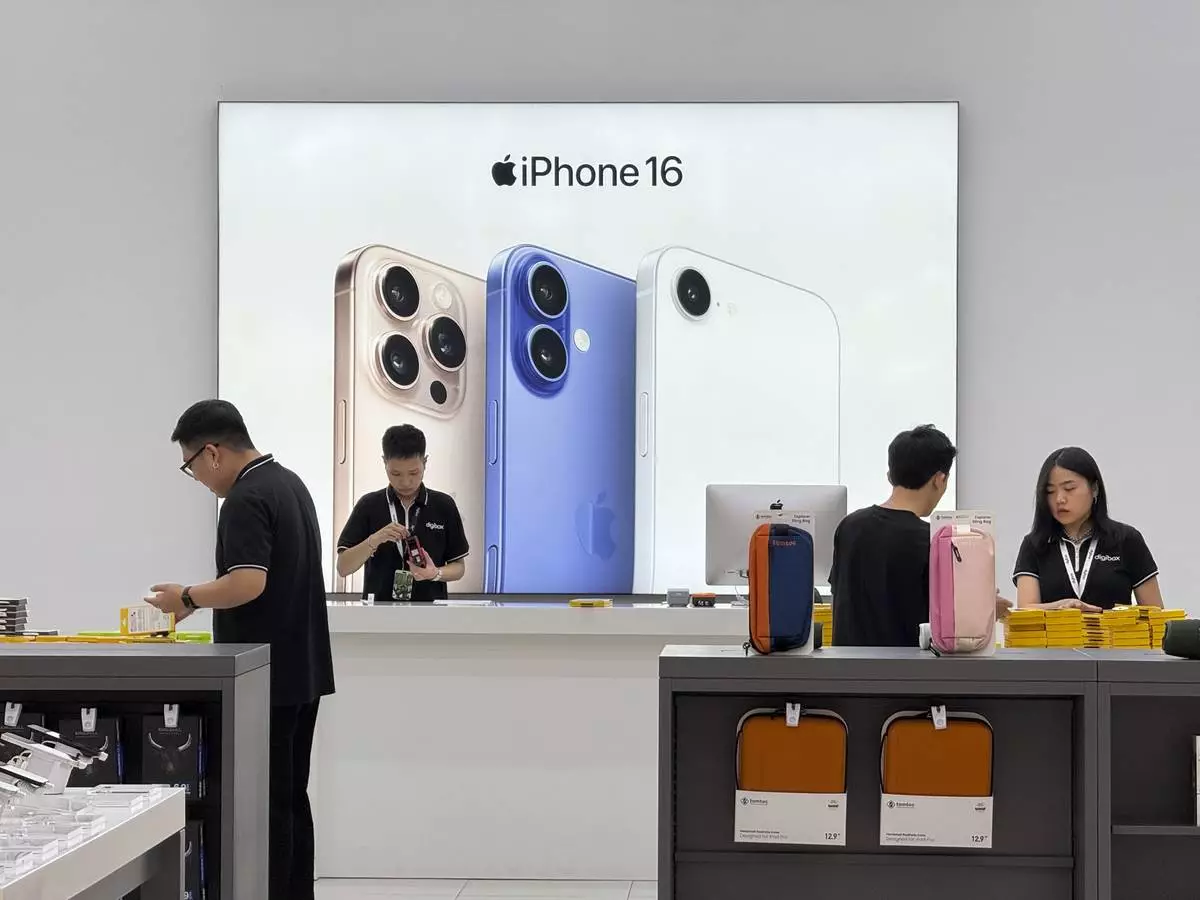
Sales staffs work at an Apple shop in Hanoi, Vietnam Thursday, April 10, 2025. (AP Photo/Hau Dinh)
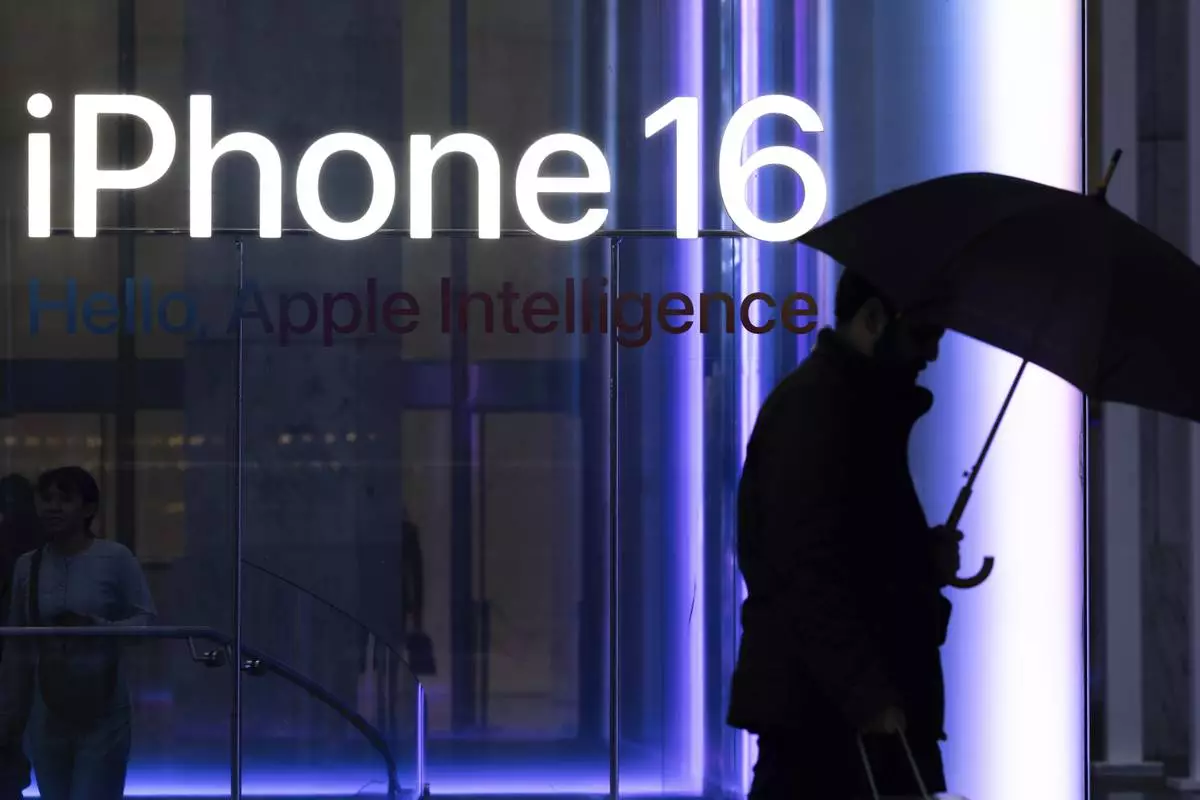
A person carrying an umbrella walks past the Apple Store on the 5th Avenue, Monday, April 7, 2025, in New York. (AP Photo/Yuki Iwamura)
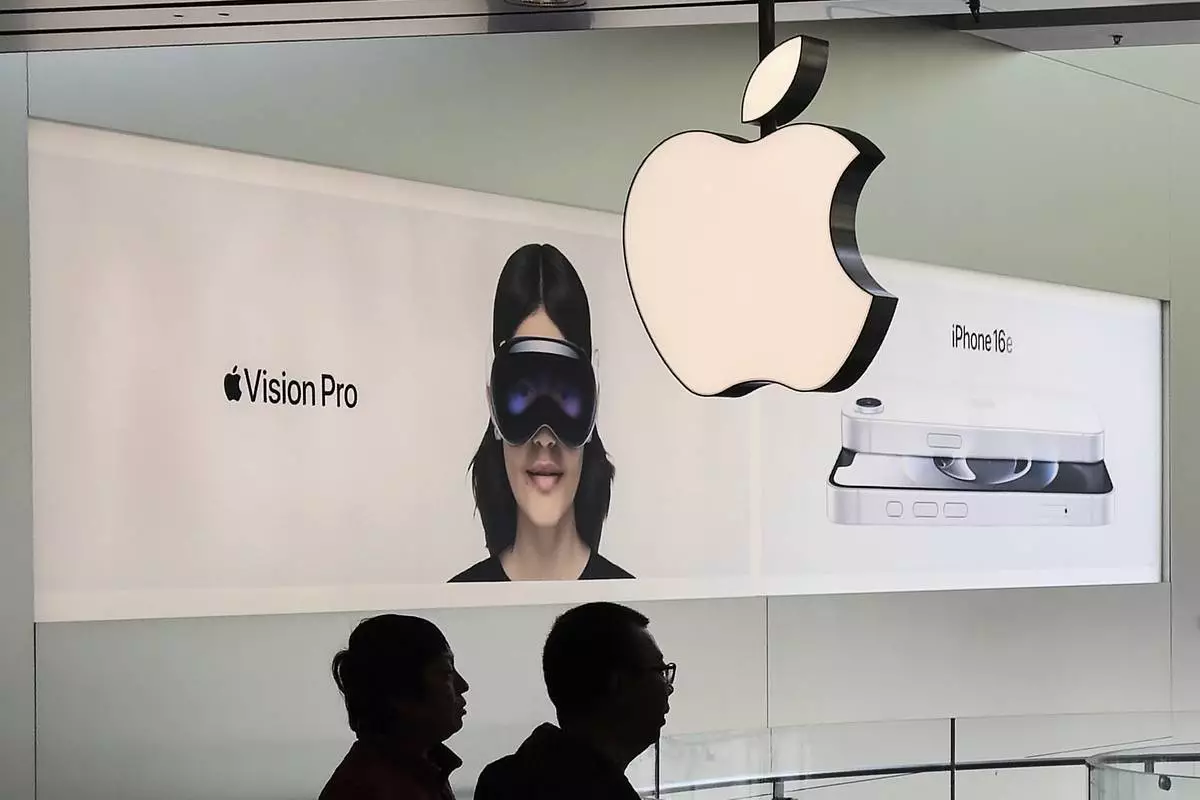
Chinese people visit an Apple Store, inside a shopping mall, in Beijing, Thursday, April 10, 2025. (AP Photo/Andy Wong)
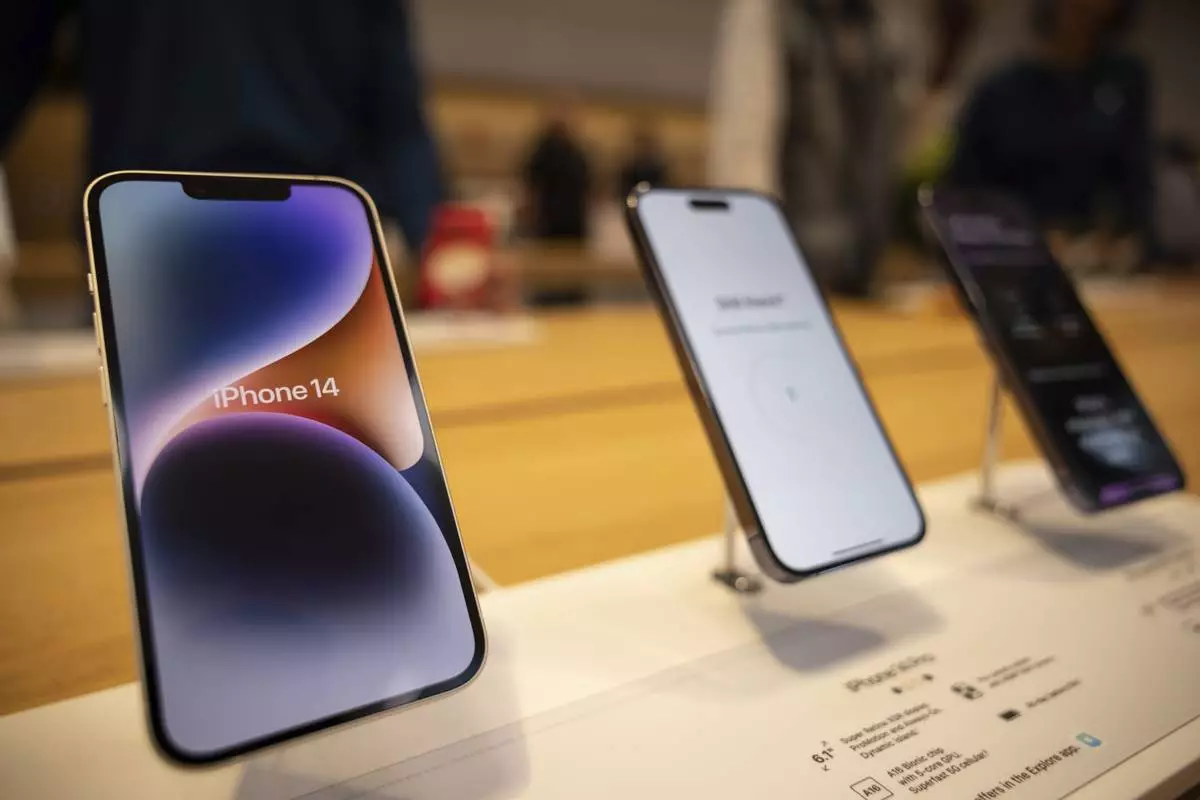
FILE - The iPhone 14, iPhone 14 Pro and iPhone 14 Pro Max are displayed at the Apple Fifth Avenue store, Friday, Sept. 16, 2022, in New York. (AP Photo/Yuki Iwamura, File)
SUMY, Ukraine (AP) — The humdrum of daily life in Sumy belies the constant threat of death its people have lived with since Russia invaded Ukraine three years ago.
Days after Russia targeted the city's center in back-to-back missile strikes, killing 35 people and injuring more than 100 others in the deadliest attack on Ukrainian civilians this year, neighbors gossiped in front of their apartment block as children played soccer in the courtyard. They paused to look up only when hearing the buzzing of attack drones and familiar thud of Ukrainian air defenses before resuming what they were doing.
Sumy is only about 30 kilometers (18 miles) from the border of Russia's Kursk region, where Ukrainian soldiers are defending the last sliver of territory they took in a surprise offensive last summer. Residents say there has been an uptick in attacks on Sumy in recent weeks, though none as bloody as Sunday's airstrike, which targeted a busy intersection.
The attack in Sumy, which had a prewar population of about 250,000, came just over a week after a Russian missile strike killed about 20 people, including nine children, in the central Ukrainian city of Kryvyi Rih. Russia said it was targeting a meeting of soldiers, but there is no evidence to support the claim.
The attacks on their cities has left many Ukrainians wondering where the next will occur and cast a shadow over the ongoing ceasefire talks being brokered by the United States. The talks have produced only muted results, as Russia insists on conditions Ukraine deems impossible and Kyiv believes Moscow's forces are gearing up for a fresh offensive.
To the people of Sumy, the talks seem far-removed from their daily struggles.
As some of the victims of Sunday's attack were laid to rest on Tuesday, Viktor Voitenko, 56, described how he ended up paralyzed in a hospital bed. He was working as a security guard when the second missile hit and shattered his spine. As he spoke, his wife Hanna, 40, lovingly applied his deodorant — a simple act he could no longer perform.
Mention of the ceasefire negotiations conjured a weary smile from her. “It’s empty talks. They don’t move anywhere. It seems to be public relations to me,” Hanna Voitenko said. “Nothing happens to bring comfort to regular people.”
Her husband offered his own take: “They are stalling for time.”
Work, errands and planned family visits brought the victims of Sunday’s attack to the intersection of Petropavlivska Street and the state university on Sunday morning.
Asia Pohorila, 20, was working at a cafe and thinking about whether to buy pastries after her shift when the first missile strike left her in shock and bleeding profusely from her legs. On Tuesday, the times “10:20” and "10:23" were still scrawled in marker on her thighs, noting when medics applied tourniquets to them.
Maryna Illiashenko and her 13-year old son, Kyrylo, heard the sound of that first blast ricochet across the center city as they waited for a bus.
They were headed to visit his grandmother, but the teenager was more excited about wrestling practice later that afternoon. Undeterred, they boarded the bus when it arrived a few minutes later. One stop later, the second missile crashed a few feet from the vehicle, scorching nearby cars, burning passengers alive, killing the bus driver and causing shrapnel to rain down. Three fragments tore through Kyrylo’s scalp and scratched Maryna’s face.
Enveloped in smoke and debris, the teen leaped out of the shattered bus window and pried open the locked door from outside, saving half a dozen trapped passengers, witnesses said.
“I don’t want to think about this as a new type of reality for Sumy city. We can clearly see that our frontline cities are being erased,” Oleh Strilka, a spokesperson for the city's State Emergency Service, said while standing outside the collapsed facade of the university building, where the second missile struck.
“The most painful thing for me is our children. Why do they need to suffer?” he asked. “I don’t want our 13-year-old kids becoming heroes.”
Liudmyla Shelukhina, 70, was waiting in a neighbor’s house for a haircut. She was standing in line in the kitchen when the windows suddenly shattered.
She said the fridge she was next to saved her life. “I would have been decapitated."
“Don’t be so dramatic,” joked her husband, Viktor, a former soldier. Their son was hospitalized in the attack.
Rescue workers like Dmytro Shevchenko, 31, have to be prepared to head to the scene of the next attack at all times. He was among the first to arrive at the university grounds on Sunday. Most people he found were too badly injured to help, he said, wiping away tears.
He holds on to little hope that ceasefire talks will bear fruit. “I just don’t believe in it,” he said.
The children’s hospital where Kyrylo Illiashenko is recovering bears the scars of repeated drone attacks. More than 100 windows were shattered only two weeks ago when a massive drone attack struck nearby, said Chief Dr. Ihor Zmislya.
As workers cleared rubble from the sites of the missile strikes Tuesday and Kyrylo expounded on his favorite computer games, an explosion sounded in the distance. From the teen's hospital window, plumes of smoke could be seen rising from a nearby railway line.
“This is our reality,” said Zmislya. “It happens all the time.”
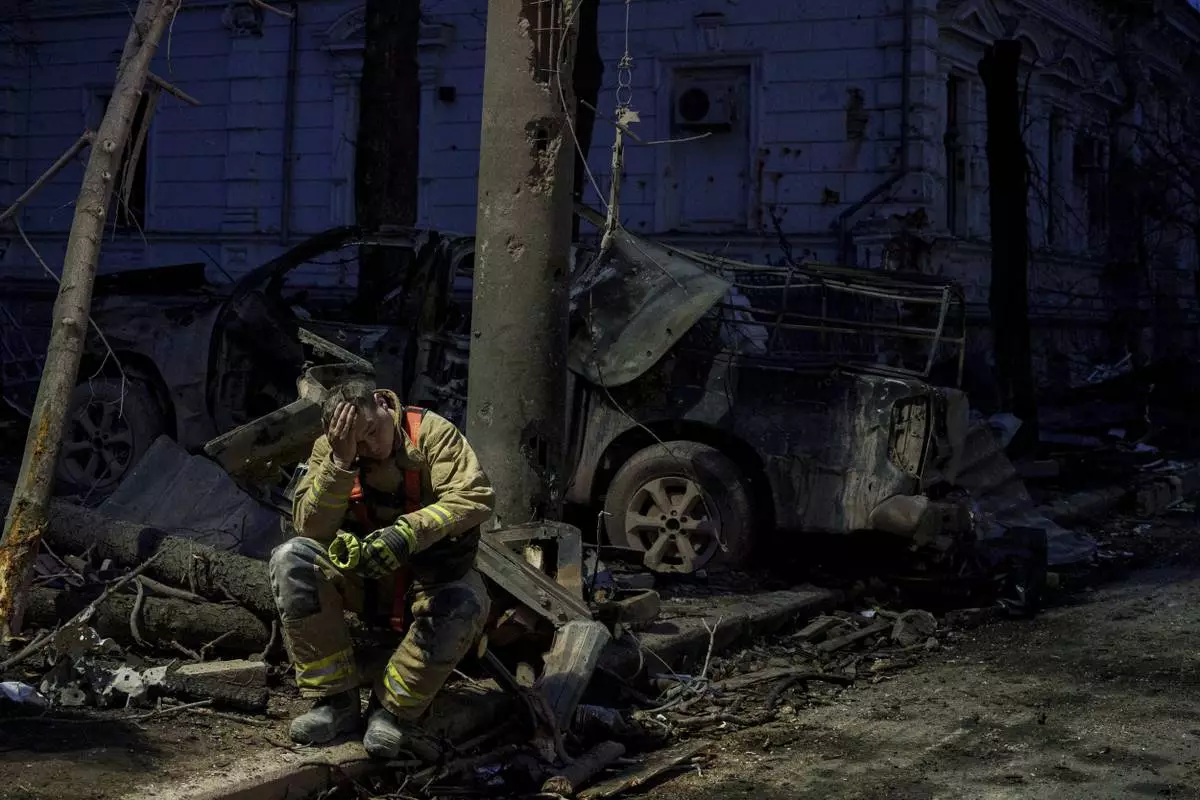
A rescue worker rests near university building destroyed by a Russian missile strike on Sumy, Ukraine, Sunday, April 13, 2025. (AP Photo/Evgeniy Maloletka)
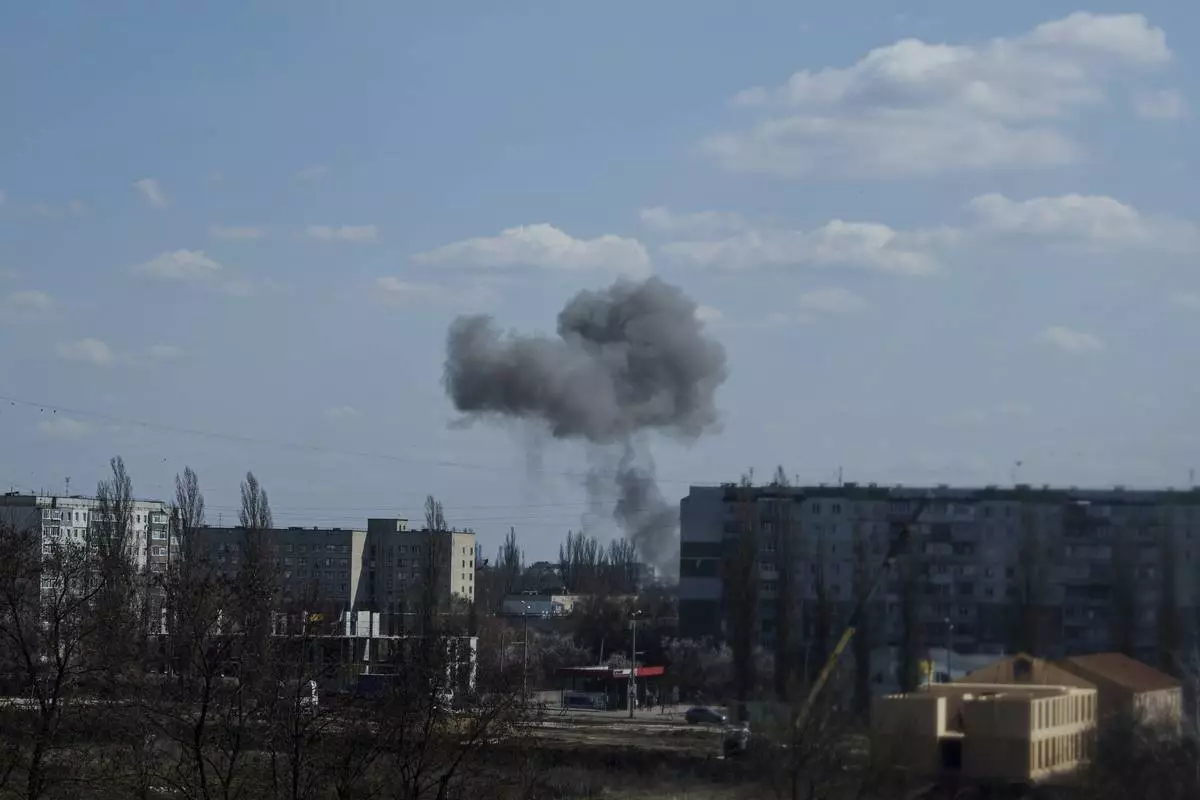
Smoke rises from an explosion following a Russian drone strike on Sumy, Ukraine, Monday, April 14, 2025. (AP Photo/Evgeniy Maloletka)
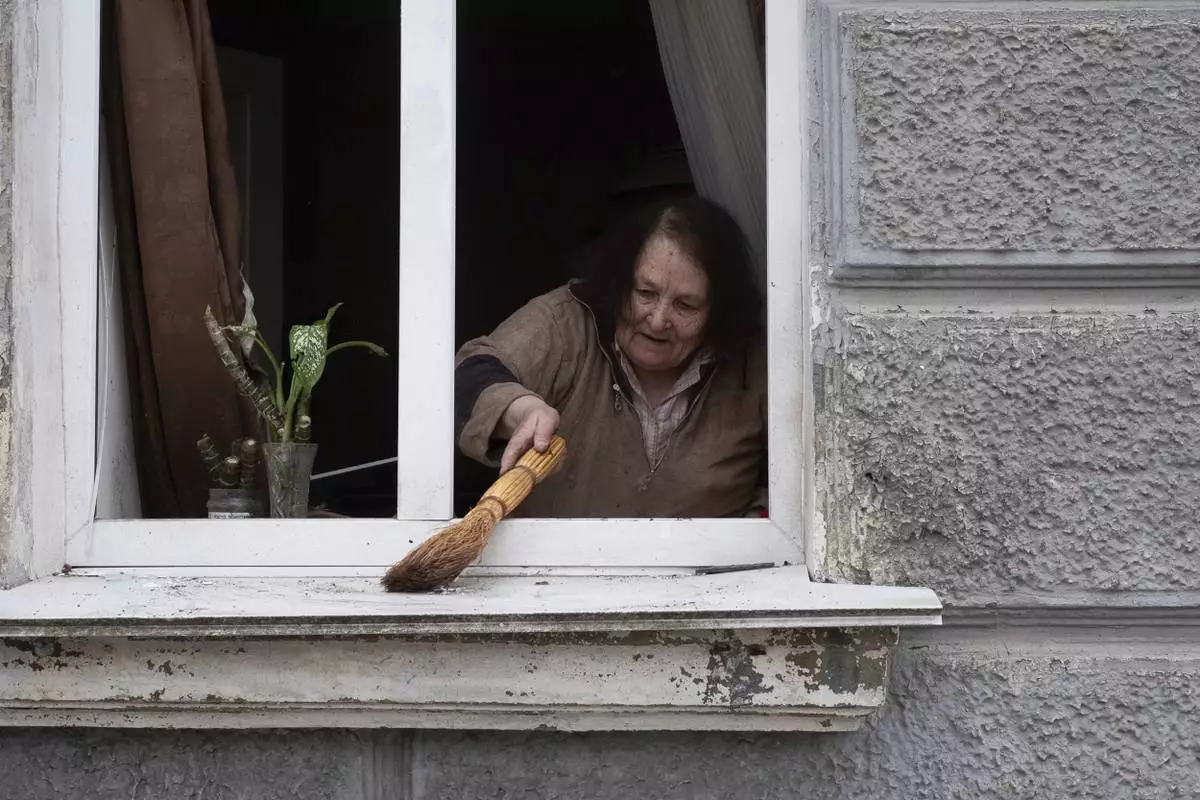
A woman cleans her window after a Russian missile strike on Sumy, Ukraine, Sunday April 13, 2025. (AP Photo/Volodymyr Hordiienko)
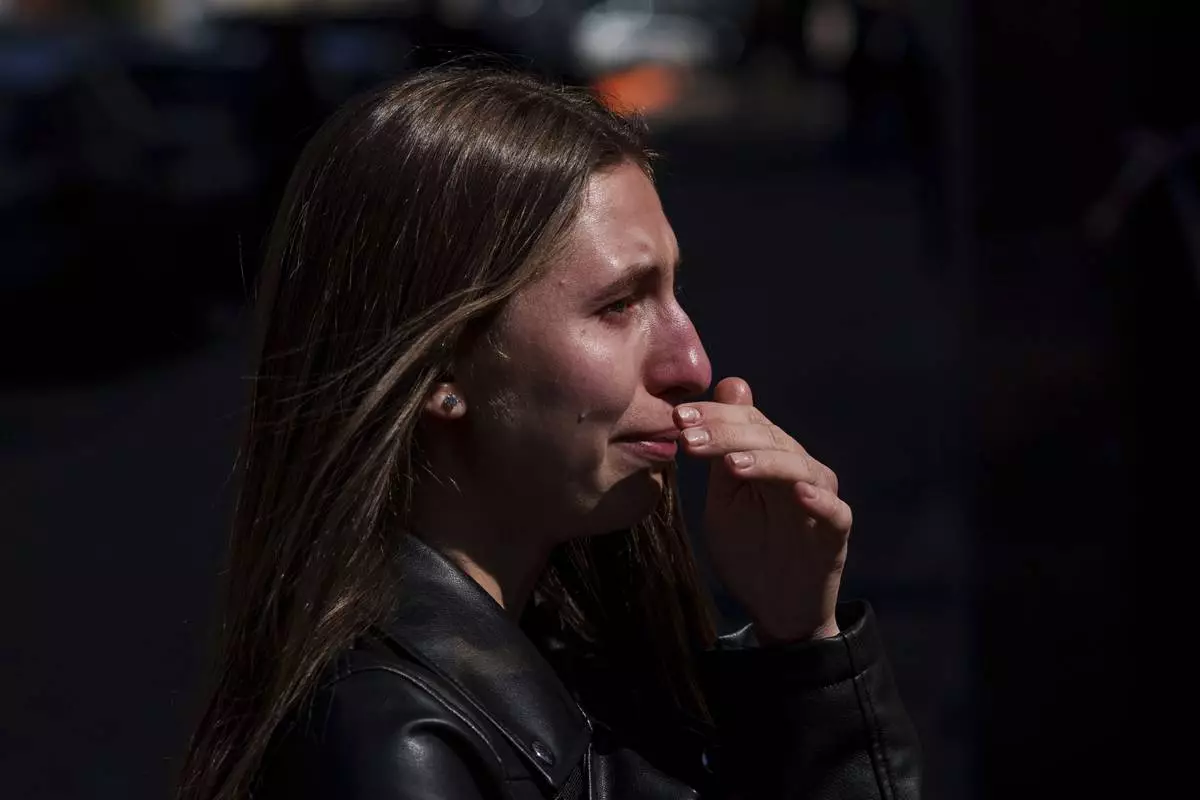
Kateryna Sitak, 23, a teacher, cries after laying flowers and toys on a site of a Russian missile strike in Sumy, Ukraine, Monday, April 14, 2025. (AP Photo/Evgeniy Maloletka)
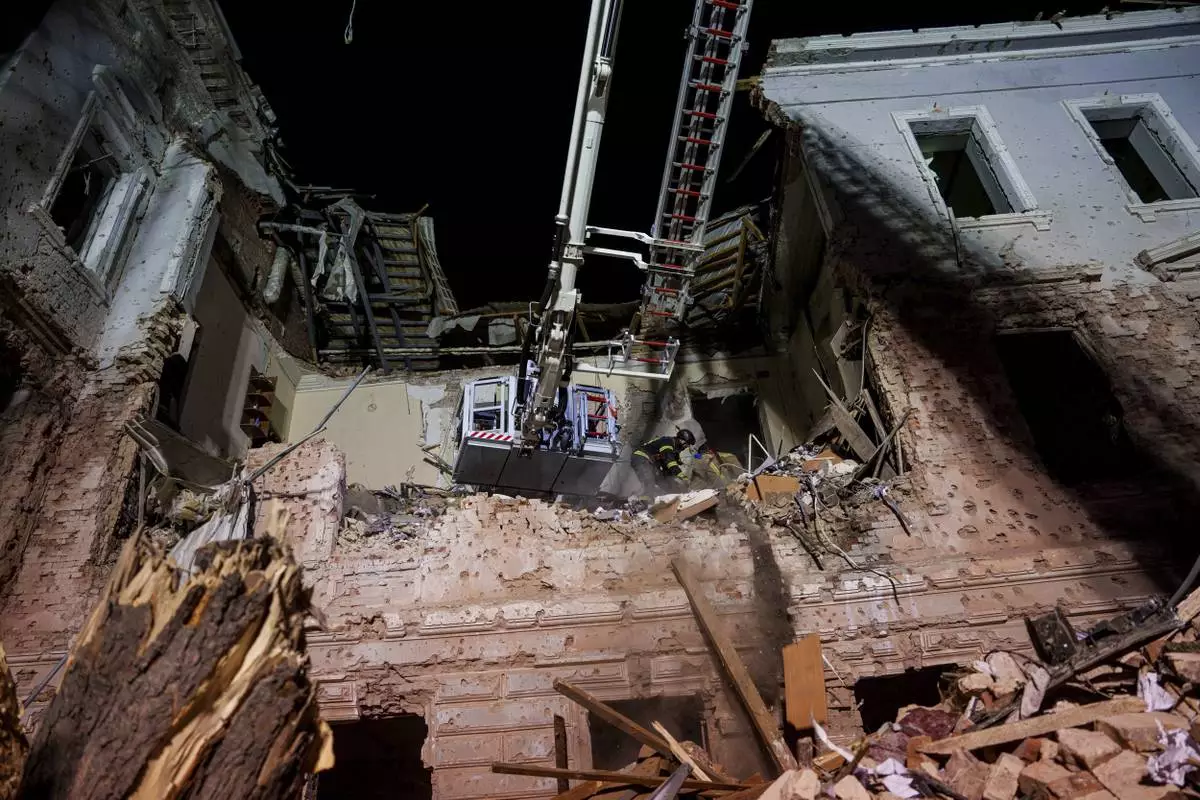
Rescue workers clear the rubble of a university building destroyed by a Russian missile strike on Sumy, Ukraine, Sunday, April 13, 2025. (AP Photo/Evgeniy Maloletka)
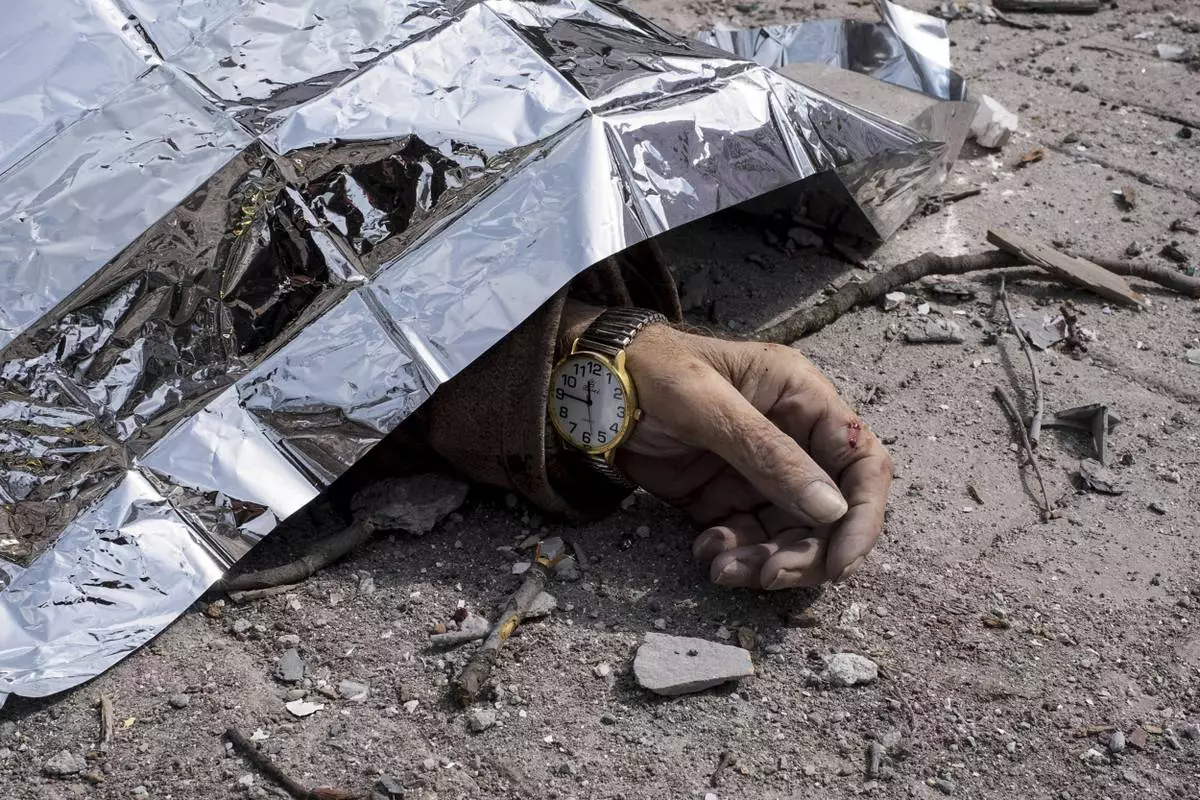
A dead body lies on the ground after a Russian missile strike on Sumy, Ukraine, Sunday April 13, 2025. (AP Photo/Volodymyr Hordiienko)
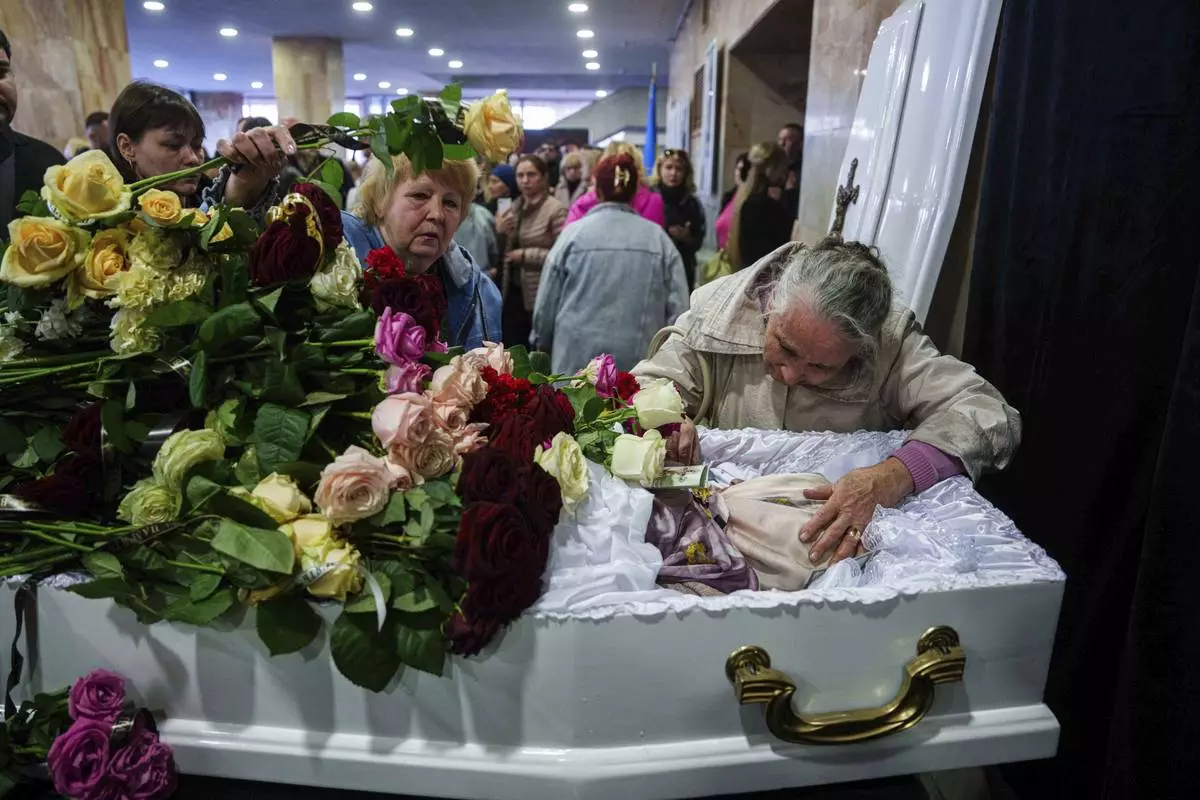
Mother Natalia says goodbye to her daughter Olena Kohut, an orchestra musician who was killed in a deadly Palm Sunday Russian attack on Sumy on April 13, during a farewell ceremony in Sumy, Ukraine, April 15, 2025. (AP Photo/Evgeniy Maloletka)
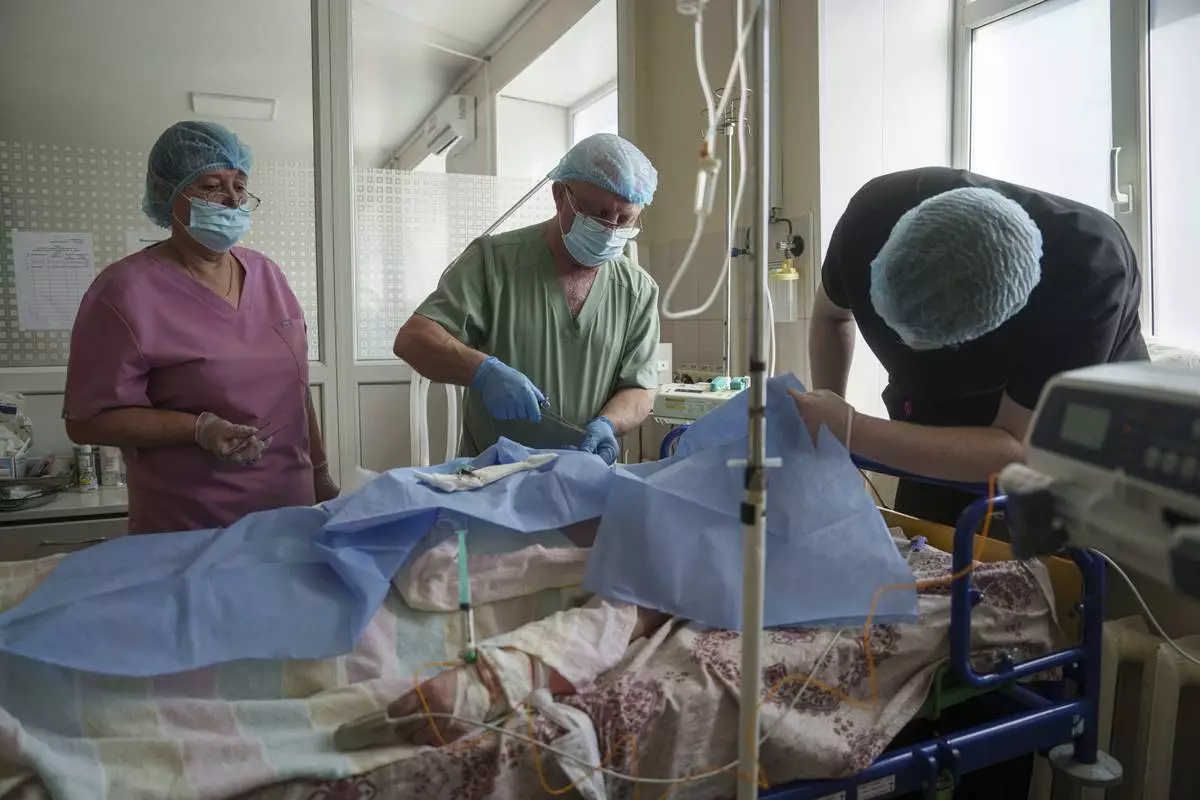
Dr. Oleksandr Zaitsev treats a patient injured in a deadly Palm Sunday Russian attack on Sumy on April 13, at a hospital ICU in Sumy, Ukraine, Tuesday, April 15, 2025. (AP Photo/Evgeniy Maloletka)
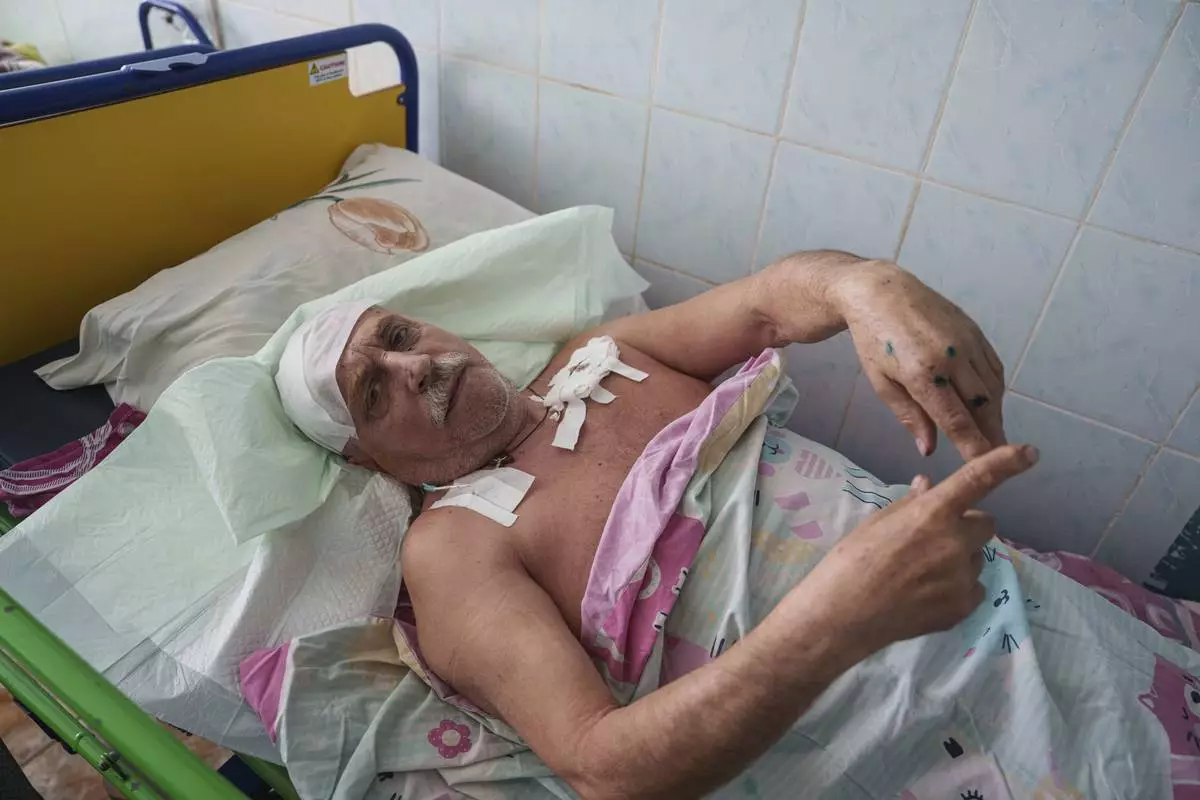
Hennadii Smolarov, 73, injured in a deadly Palm Sunday Russian attack on Sumy on April 13, lies on a bed at a hospital in Sumy, Ukraine,Tuesday, April 15, 2025. (AP Photo/Evgeniy Maloletka)
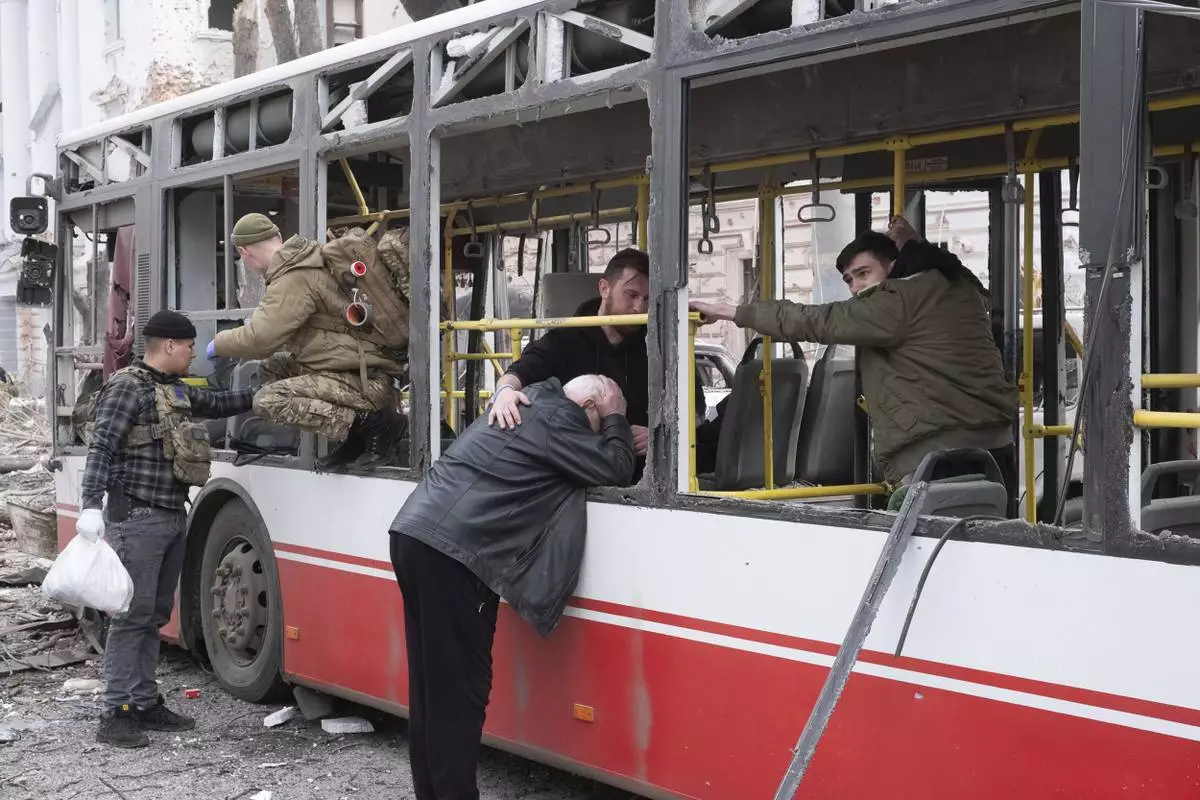
A man cries as he leans on the bus that was hit by a Russian missile on Sumy, Ukraine, Sunday April 13, 2025. (AP Photo/Volodymyr Hordiienko)
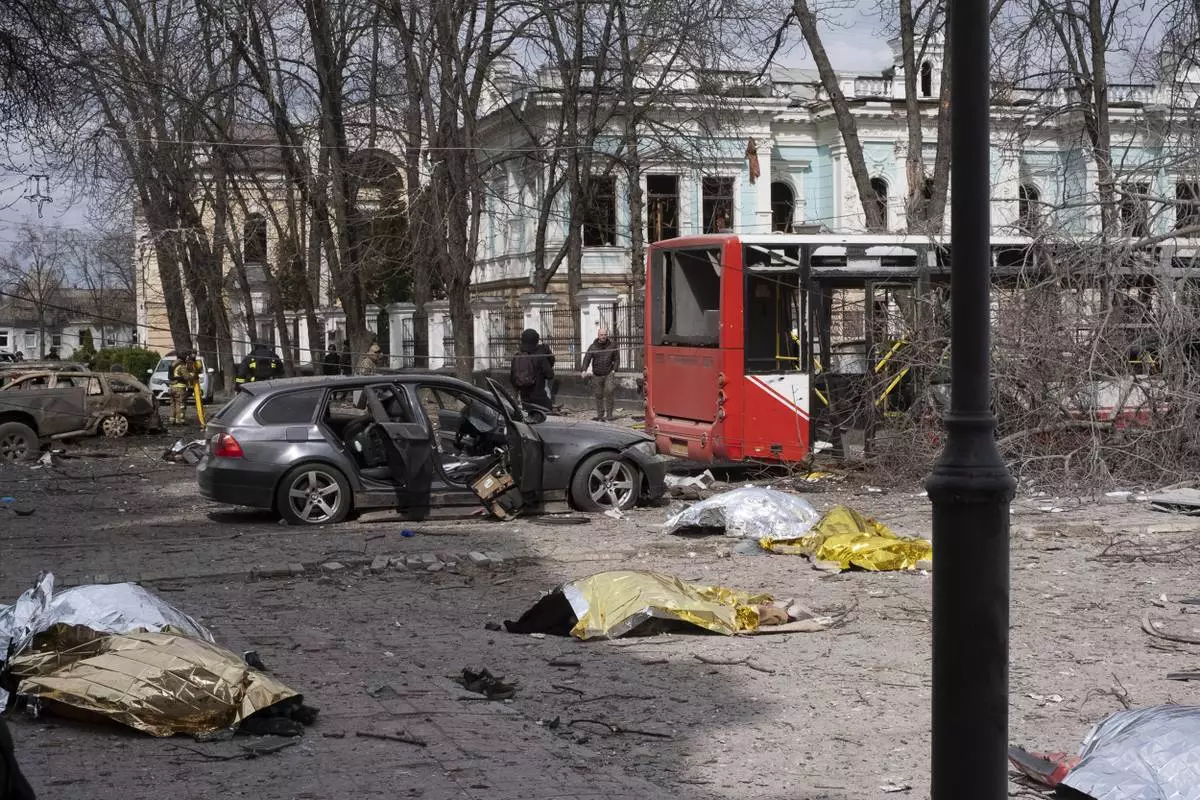
Dead bodies lie on the ground after a Russian missile strike on Sumy, Ukraine, Sunday April 13, 2025. (AP Photo/Volodymyr Hordiienko)
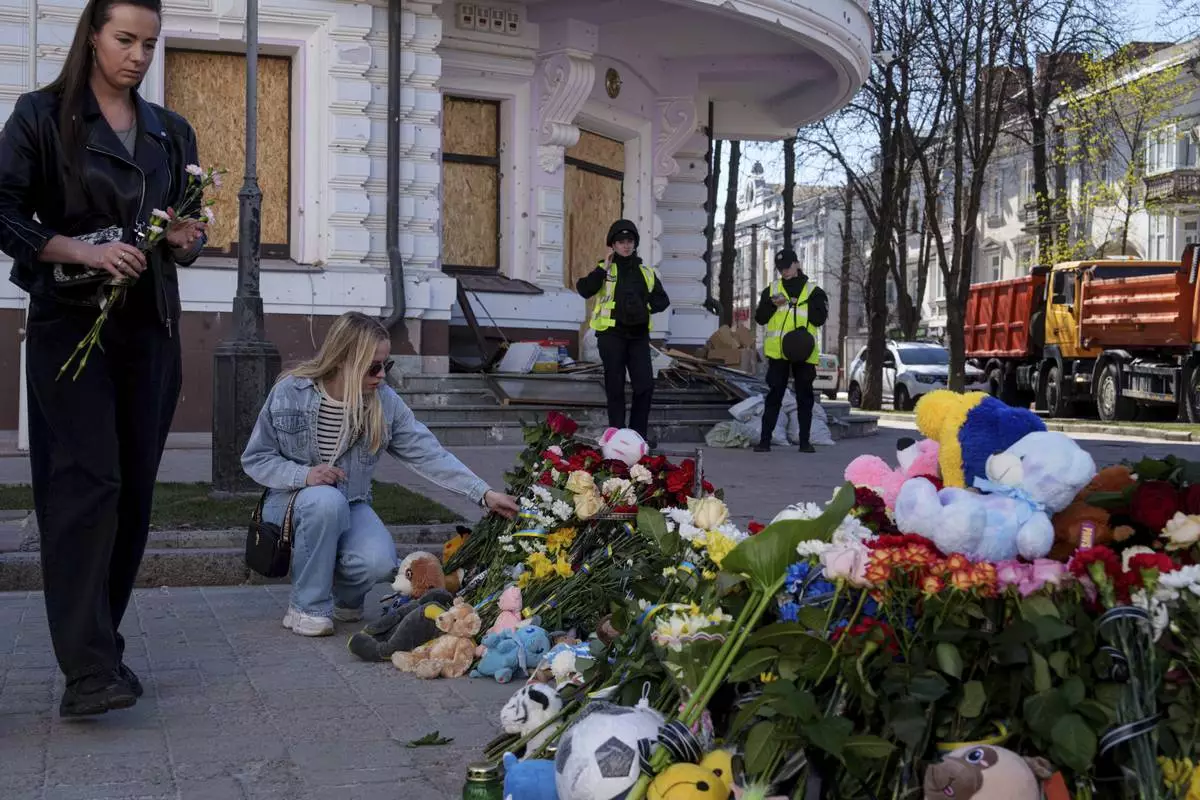
Women put flowers on a site of a Russian missile strike in Sumy, Ukraine, April 15, 2025. (AP Photo/Evgeniy Maloletka)
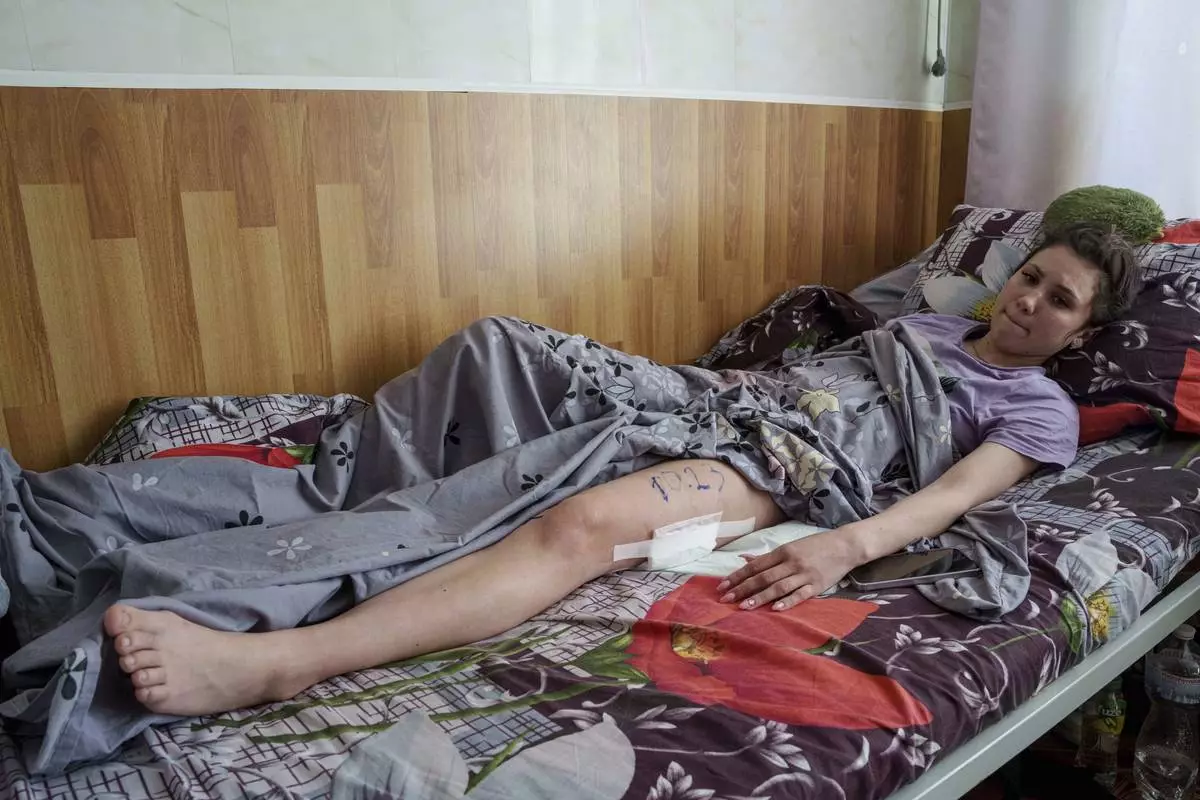
Asia Pohorila, 20, injured in a deadly Palm Sunday Russian attack on Sumy on April 13, lies on a bed at a hospital in Sumy, Ukraine, Tuesday, April 15, 2025. (AP Photo/Evgeniy Maloletka)
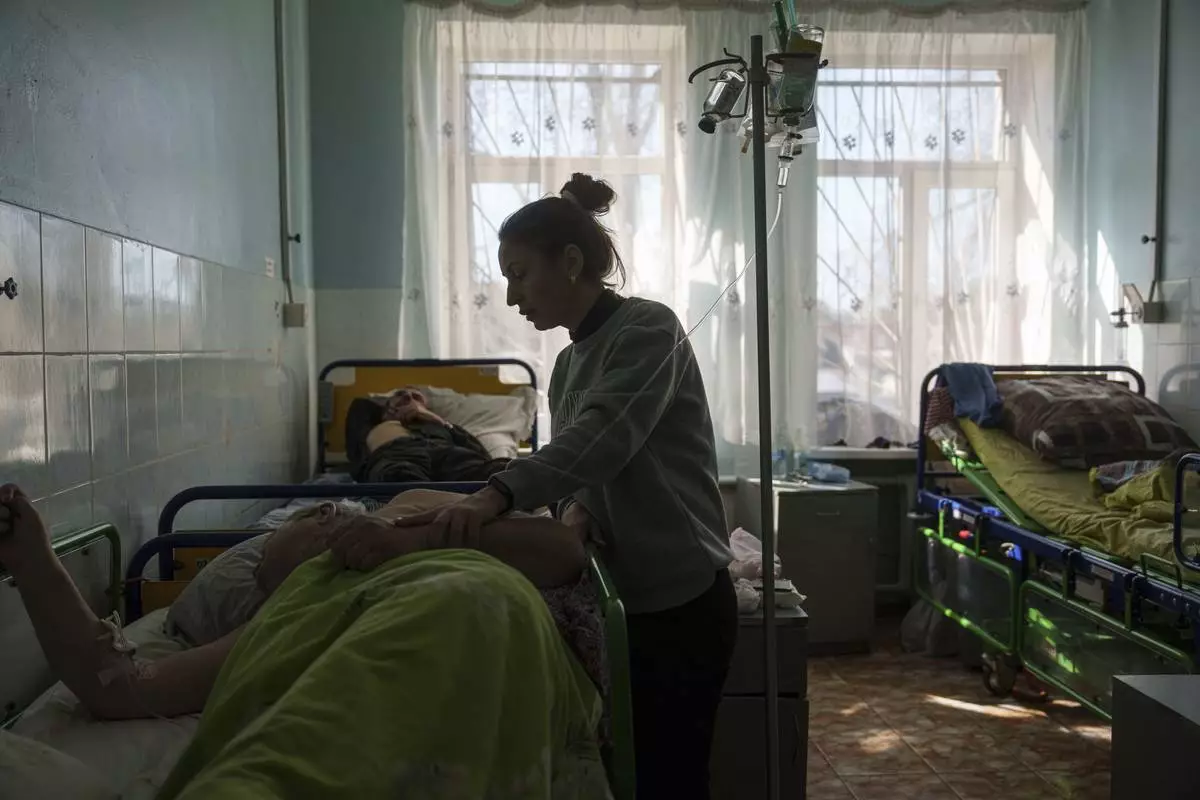
Hanna seeks to her husband Victor Voitenko, injured in a deadly Palm Sunday Russian attack on Sumy on April 13, at a hospital in Sumy, Ukraine, Tuesday, April 15, 2025. (AP Photo/Evgeniy Maloletka)
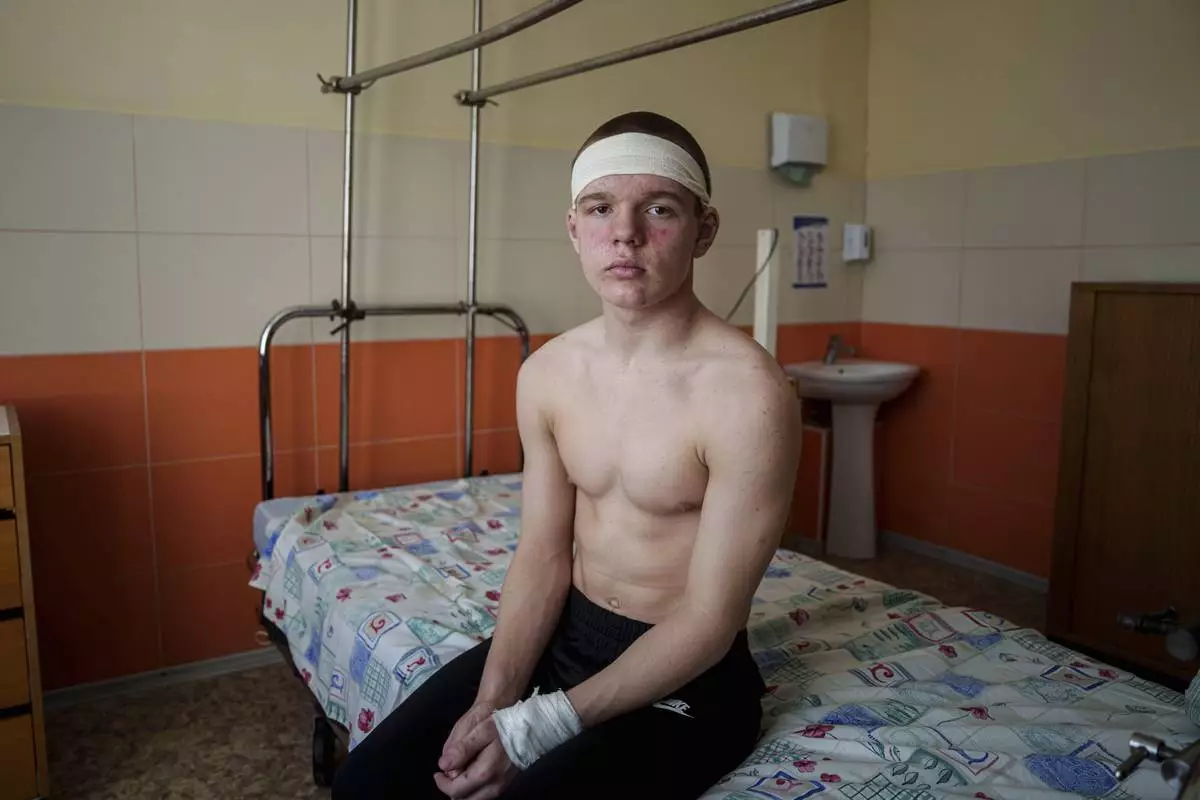
Kyrylo Illiashenko, 13, sits on a hospital bed, Monday, April 14, 2025, after being injured on Sunday by a Russian missile strike on Sumy, Ukraine, while trying to help others evacuate a burning bus that he later exited through a shattered window. (AP Photo/Evgeniy Maloletka)






